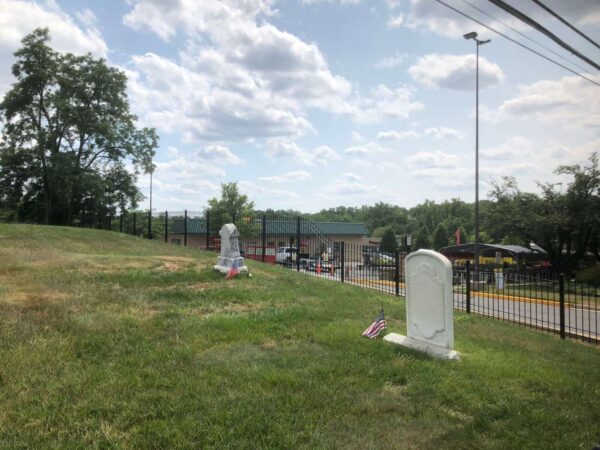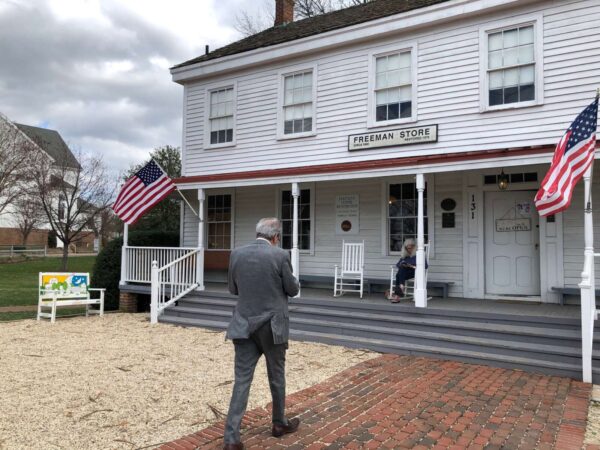
Before the Pan Am Shopping Center in Merrifield gets redeveloped, Fairfax County staff say the adjacent, centuries-old cemetery should probably get examined.
The Fairfax County Department of Planning and Development released a staff report last week recommending that mixed-use development be allowed at the shopping center, opening the door for property owner Federal Realty to build 585 residential units and expand its retail.
In addition to setting parameters for density, transportation improvements and other land use factors, the report reiterates that any development “should respect” the Thompson Family Cemetery, which predates the shopping center by almost two centuries.
However, the exact boundaries of the cemetery are unclear, according to the staff report.
“No documentation has been found that indicates the cemetery was delineated prior to construction of the Pan Am shopping center,” staff said, suggesting that a professional archaeologist conduct “remote sensing, specifically a ground penetrating radar survey…on the surrounding driveway and parking areas prior to redevelopment.”
While the cemetery only has two standing headstones, marking four burials, a 1989 walkover survey of the half-acre of land indicated that there are at least 23 possible grave sites, county staff said, citing an archived memo.
Known occupants include Confederate soldier Armistead T. Thompson, who died on Nov. 23, 1864 as a prisoner of war at Point Lookout, Maryland, according to an inscription on his tombstone.
From the staff report:
The Thompson family suggests that the first burial in the cemetery was in 1792 with burials continuing through at least 1917. Family lore suggests that there were many more burials. Furthermore, given the dates of cemetery use — prior to emancipation — the potential remains for burials of enslaved individuals on the property; at least one enslaved girl is noted in the 1850 census for Lawson Thompson who owned the property.
The Thompson family still owns and maintains the cemetery, which was nearly disturbed by workers seeking to build a storm sewer in 1979 until one family member, Alfred Thompson, blocked them with a sledgehammer and got arrested.
According to the archived Washington Post story, the Pan Am developers sought to take over the land when they built the shopping center in 1973, and plans to widen Route 29 also posed a threat.
The cemetery is now listed in the Fairfax County Inventory of Historic Sites. Calling it “a significant heritage resource,” the county’s current comprehensive plan prohibits any future widening of Route 29 from encroaching on the graveyard.
The newly proposed comprehensive plan amendment would maintain that condition, but it suggests a follow-up to the 1989 survey is needed.
“A new more detailed survey of the cemetery to determine the number of grave sites should be conducted using methods that would be more effective than a visual, walkover survey,” staff said.
The Fairfax County Planning Commission will hold a public hearing on the proposed amendment at 7:30 p.m. on June 28, with the Board of Supervisors following at 4 p.m. on July 25.
Federal Realty’s redevelopment plan is still under review by county staff and won’t go through the public hearing process until after the amendment gets approved.

The Town of Vienna could have a historical gold mine waiting to be found in old-timey toilets underneath the grounds of its Freeman Store and Museum (131 Church Street NE).
Historic Vienna Inc., the nonprofit that has operated the store since 1976, plans to fund an archaeological dig of the property after a survey identified several potential areas of interest, including two sites that might have the remains of either wells or outhouses.
“The gold in this property is probably in the privies and the well. Apparently, if you read about this stuff, [the past owners] would just at some point start throwing a lot of trash down as they changed over or moved on, and there’s often some really revealing stuff,” Historic Vienna President Anne Stuntz told the Vienna Town Council on Oct. 10.
The Freeman Store was built in 1859 by New Jersey merchants Abram and Susan Lydecker as a house and Vienna’s first general store. It benefitted from new railroad tracks at what is now the intersection of Church and Mill streets, according to Historic Vienna.
The building also served as a post office and was occupied by both Union and Confederate troops during the Civil War. After its last resident moved out in 1955, the store was sold to the town in 1969 and restored in 1976.
Historic Vienna has wanted to explore the site “for decades,” Stuntz said, but this year, the organization finally accrued the approximately $20,000 needed for a dig, thanks to the volunteers who sell books out of the store’s Used Book Cellar.
“We think [the dig] will materially increase our historical understanding, and we’d end up with more stories to tell about the Freeman Store and early Vienna history,” Stuntz said.
According to a letter to Town Manager Mercury Payton, the town previously approved a non-invasive ground-penetrating radar (GPR) survey of the property on Nov. 1, 2021 that found 36 potential areas of interest, including four sites that have been singled out for excavation:
- The two possible wells or privies
- A side yard where there could’ve been a barn
- The immediate backyard, where there may be either a tree or a trash dump
The sites will each be about 4 square meters in size, but they could expand “if significant finds are uncovered,” the letter said.
If approved, the dig would be done by The Ottery Group over 10 business days between November and the end of March — ideally in early March, when the days will be longer and the ground warmer, Historic Vienna treasurer Leigh Kitcher said.
The organization said the excavations will avoid coinciding with major events, and the sites will be covered with tarps at night. Stuntz and Historic Vienna Vice President Nancy Moats have discussed even having people sleep over at the store.
“We certainly don’t want Civil War relic hunters trying to find goodies on our property,” Kitcher said. “So, there’s a balance between how much you promote this and showing little dug-up holes.”
After the dig, Ottery will restore the land and bag and document any artifacts. Historic Vienna will be responsible for their long-term storage, possibly with Fairfax County’s archaeology team.
Moats suggested the group could host a public archaeology day or a small exhibit at the Freeman Store “if the number of finds and their significance warrants it.”
“We’re all about education and informing the public in the Town of Vienna,” she said.
Since Historic Vienna leases the Freeman Store property from the town, the town council needs to amend the lease before the dig proceeds. That vote has been scheduled for Oct. 24, but the council was decidedly enthusiastic about the project.
Councilmembers Howard Springsteen and Nisha Patel speculated that the town use the excavation to plant a holiday tree on the property. Ed Somers advocated for keeping any findings in Vienna, though that may not be feasible for larger objects or ones that need a climate-controlled environment.
“I defer to [Historic Vienna], but I would like to keep whatever’s found in Vienna in Vienna somewhere so people can see it,” Somers said.

